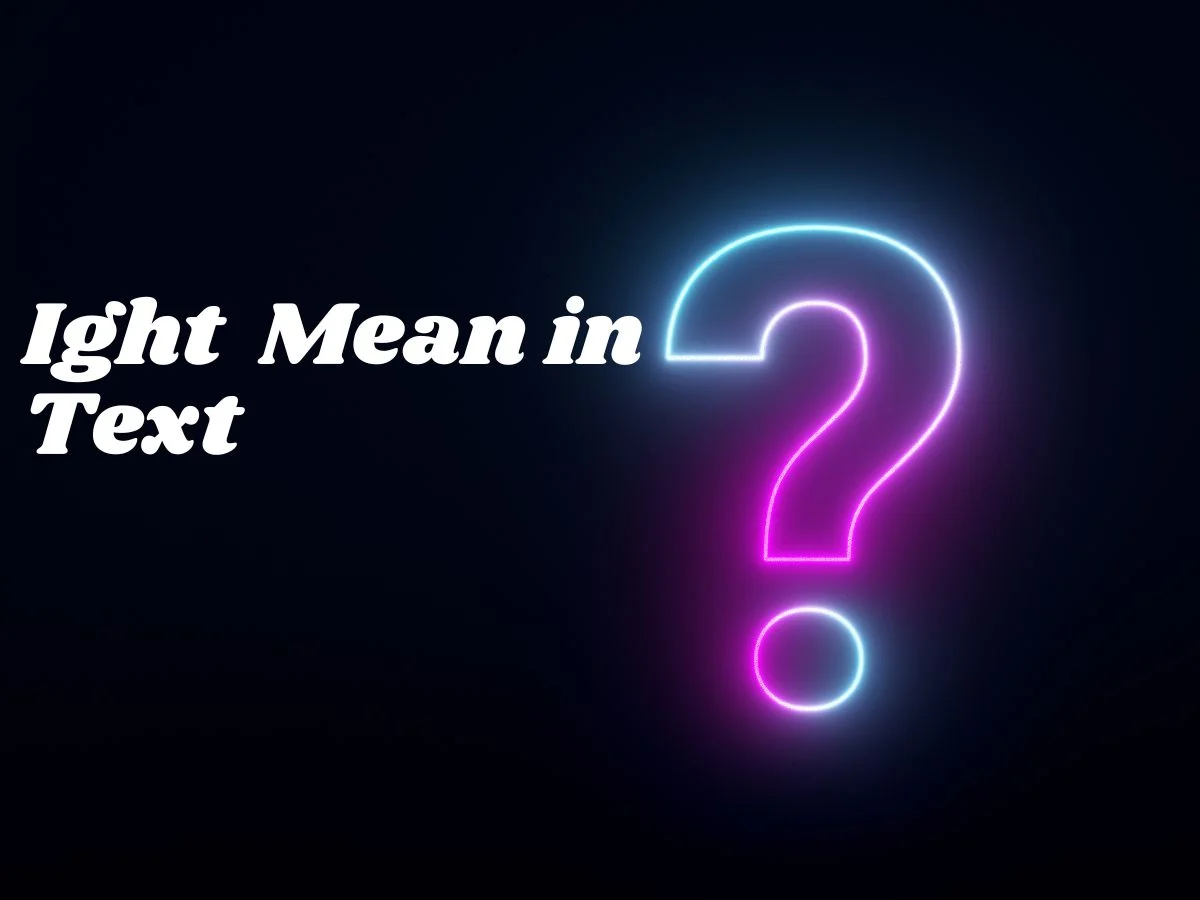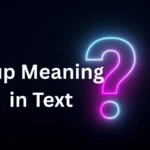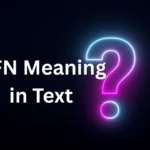In the fast-paced world of digital communication, slang terms have taken center stage, redefining the way we text, tweet, and talk online. One such term that has made its way from casual street lingo to everyday online language is “ight.”
If you’ve ever received a message that simply said “ight,” you may have paused to decipher its tone, intent, or even meaning. Is it a lazy abbreviation of “alright”? Is it passive-aggressive? Friendly? Dismissive? The ambiguity of “ight” has led to many interpretations—and misunderstandings.
Understanding what “ight” means in text isn’t just about deciphering a slang term; it’s about tapping into a cultural shorthand that reveals tone, mood, and even social identity.
This article breaks down the meaning, history, usage, and nuances of “ight,” helping you navigate its usage in various communication settings. Whether you’re a student, parent, or professional, knowing this term can help you stay current and clear in conversations.
Definitions & Meaning
“Ight” is a shortened, slang version of the word “alright.” Pronounced as “aight,” the term is commonly used in informal text and spoken language. It often conveys agreement, acknowledgment, or acceptance with a more relaxed or nonchalant tone.
Common meanings include:
- Agreement: “Ight, I’ll be there at 5.”
- Acknowledgment: “Ight, I hear you.”
- Dismissive acceptance: “Ight, whatever.”
- Cool or okay: “That new song is pretty ight.”
Despite being a slang term, the meaning of “ight” heavily depends on context and tone. It can suggest friendliness or indifference, confidence or indifference—depending on how and where it’s used.
In texting, brevity is key, and “ight” serves as a conversational shortcut that reduces “alright” to a mere syllable. It’s used widely among younger demographics but has been adopted by a broader audience thanks to pop culture and internet memes.
In short, “ight” is an informal affirmation or response that is neutral to mildly positive, sometimes passive-aggressive when used dismissively.
Origins & History
The origin of “ight” can be traced back to African American Vernacular English (AAVE), where “aight” emerged as a phonetic spelling of “alright.” Over time, the pronunciation softened to “ight,” dropping the initial “a.”
Evolution Timeline:
- 1970s–80s: The term “aight” appears in African American communities and hip-hop lyrics as an expression of coolness or affirmation.
- 1990s: Popularized by rap and R&B artists. “Aight” starts gaining mainstream attention through music, movies, and TV shows.
- 2000s–2010s: Social media platforms like MySpace, Facebook, and Twitter help the word spread to a younger, more diverse audience.
- 2020s: “Ight” becomes a common digital slang word, often seen in memes, texts, and online conversations.
Cultural Influence:
“Ight” isn’t just a linguistic contraction—it’s a cultural artifact. It reflects the influence of Black culture on mainstream language, particularly through music, television, and internet trends.
The word’s morphing over the years—“aight” to “ight”—also illustrates how language evolves in response to digital communication needs, favoring short, punchy expressions that get the message across with minimal effort.
Usage in Different Contexts
1. Social Media
On platforms like Twitter, Instagram, and TikTok, “ight” is often used in captions, comments, and memes. It’s common in humorous or sarcastic contexts.
- Example: “He said he was just ‘friends’ with her. Ight 😂”
2. Texting
In casual texting, “ight” works as a quick way to confirm or respond. Its brevity makes it perfect for rapid-fire conversations.
- Example: “Can you bring chips to the party?”
“Ight, no problem.”
Depending on punctuation or context, it can also show passive-aggressive tones:
- “Ight.” (with a period) might suggest frustration or sarcasm.
3. Professional Settings
Rarely used in formal communication, “ight” is inappropriate for emails, presentations, or business chats. However, it may occasionally appear in workplace group chats if the tone is extremely informal and everyone’s comfortable with slang.
4. Pop Culture
“Ight” has been featured in various memes, song lyrics, and even comedic skits. It’s part of the larger internet culture where words get abbreviated for humor or speed.
- Example meme:
When your mom says “we’ll see” after you ask for something.
Caption: “Ight bet.”
Common Misunderstandings & Clarifications
Despite its simple structure, “ight” can be easily misinterpreted. Here are a few common misconceptions:
1. “Ight” = Yes?
Not always. While often used to agree or acknowledge, it’s not a definitive “yes.” It might mean:
- “I hear you, but I’m not thrilled.”
- “Okay, fine.”
- “Meh, if you insist.”
2. Tone is Universal?
No. Tone matters. For instance:
- “Ight!” (with an exclamation mark) feels excited or supportive.
- “Ight.” (with a period) may feel cold or indifferent.
- “Ighttttt” (stretched) feels laid-back or amused.
3. Can I Use It with Anyone?
Using “ight” with older generations, in formal settings, or with people unfamiliar with digital slang may lead to confusion. It’s best reserved for informal, familiar circles.
4. Is It Spelled “Ight” or “Aight”?
Both are acceptable in slang, but “ight” is more abbreviated and more commonly used in digital settings. “Aight” is phonetically clearer and often used in spoken language or more stylized text.
Alternatives & Synonyms
If “ight” feels too casual or unclear, here are alternatives you can use depending on the tone and setting:
| Alternative | Tone | Example |
| Alright | Neutral | “Alright, I’ll do it.” |
| Okay / OK | Neutral, slightly formal | “OK, see you later.” |
| Got it | Affirmative, casual | “Got it, thanks!” |
| Cool | Chill, relaxed | “Cool, I’m down.” |
| Sure thing | Friendly, agreeable | “Sure thing, I’ll handle it.” |
| No worries | Reassuring, relaxed | “No worries, I got you.” |
| Bet | Urban slang, confident | “Bet, I’ll be there.” |
These options can help you adjust tone and clarity, depending on the audience and context.
Frequently Asked Questions (FAQ)
Q1: Is “ight” rude?
A1: Not necessarily, but it can come off as dismissive depending on tone and punctuation. Always consider the context.
Q2: Can I use “ight” in emails?
A2: It’s best avoided in professional emails or formal communication. Use “alright” or “okay” instead.
Q3: What’s the difference between “ight” and “aight”?
A3: “Aight” is a more phonetic spelling and closer to spoken slang, while “ight” is more text-based and abbreviated.
Q4: Why do people say “ight bet”?
A4: “Ight bet” is slang for confirming a challenge or agreement, meaning “Alright, I accept that” or “Let’s do it.”
Q5: Is “ight” grammatically correct?
A5: No. “Ight” is slang and not standard grammar, but it’s widely accepted in informal settings.
Q6: Who typically uses “ight”?
A6: It’s most popular among teens and young adults, especially in online or urban communities.
Q7: Can “ight” express sarcasm?
A7: Yes. Depending on tone or punctuation, it can definitely convey sarcasm or passive aggression.
Conclusion
“Ight” may look like a random assortment of letters, but it’s packed with meaning, cultural influence, and emotional nuance.
Rooted in AAVE and propelled by pop culture, this slang term has become a staple of digital communication—especially among younger generations.
Whether it’s used to agree, acknowledge, or subtly dismiss, “ight” captures a wide range of sentiments in just four letters.
However, as with many slang terms, tone, context, and audience matter. A simple “ight” can affirm, confuse, or even offend, depending on how it’s delivered.
That’s why understanding its origins, variations, and appropriate usage is key to navigating modern conversation—whether in text messages, memes, or social media replies.
So next time you see “ight” pop up on your screen, you’ll know exactly what it means—and how to use it like a pro.









